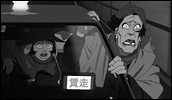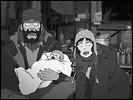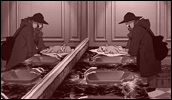Tokyo Godfathers
- Year
- 2003
- Original title
- Tokyo Goddofazasu
- Japanese title
- 東京ゴッドファーザーズ
- Director
- Cast
- Running time
- 87 minutes
- Published
- 29 November 2004



by Michael Arnold
While they haven't hit the vast audience the Ghibli-Disney releases have magically reached, Satoshi Kon's films have at least reserved a first class seat in the most recent leg of the anime world tour. Kon's first cinematic effort, the Magnetic Rose segment of Katsuhiro Otomo's wonderful omnibus film Memories (1995), made its international debut at the 1995 Anime Expo in Los Angeles (in untranslated Japanese, nonetheless) half a year before its Japanese debut. Later Perfect Blue (1998) shocked festival audiences and Millennium Actress (2002) met with enthusiasm in international cinema and video distribution. Tokyo Godfathers took a brief tour of major U.S. cities in early 2004, squeaking out of the theaters just in time for an April DVD release. This challenging director has been at the frontlines for some of the anime explosion's biggest booms. So what does his new movie add to this cross-cultural tradition?
Kon's first comedy tracks the movements of three homeless Tokyo residents, each of whom carries little more than the burden of an unfortunate past. Gin is a ruined middle-aged gambler who left his family in debt. Teenage Miyuki ran away from her Bible-thumping mother and police officer father after a violent incident at home. The flamboyant Hana is a gay ex-cabaret waitress who left his job after losing his temper at work (and his boyfriend, a cartoon Ken Takakura) and now dreams of a baby of his own to ease memories of a motherless childhood. After Hana and Gin watch a nativity play at a Christmas soup kitchen, the three go rummaging through garbage to retrieve a present hidden for Miyuki. Lo and behold, to their surprise they uncover the greatest gift of all-a beautiful baby girl. After flirting with the idea of taking the baby to the police, the three decide to track down the baby's parents on their own.
You may have already heard that the "three hobos and a baby" idea originated in the 1948 Ford-Wayne film Three Godfathers, but the story's passage from origin to anime isn't nearly that simple. Peter B. Kyne's 1913 novel had actually been made into no fewer than four film versions (including Ford's first 1919 adaptation) before being wrangled into western melodrama by Wayne and crew. Afterwards the poor baby was abandoned in several other places, probably the most traumatic of which being Hollywood's Three Men and a Baby in 1987 (itself a remake of sorts of Coline Serreau's Trois Hommes et un Couffin, 1985). The first feature animation treatment of this scenario appears to be Fox Animation's tedious and unattractive Ice Age (2002), beating Tokyo Godfathers by about two years. The idea was a testament to the longevity of Hollywood's message long before landing in Kon's to-do pile.
That's not to say the anime version brings nothing new to the story though. Kon and co-screenwriter Keiko Nobumoto (Cowboy Bebop the Movie) do introduce a few new twists to the chase. The baby's appearance starts a domino effect of coincidence that leads the group to several odd locations including a gang wedding ceremony, the slum home of a Latin American assassin and Hana's old stomping grounds, all of which add flavor to the bread crumbs of plot along the way. True to its title, the film is also as much about Tokyo as it is about Godfathers, and the movie's urban atmosphere almost becomes a character in itself. Obviously enough, it is the unique animation style and hyperrealistic Tokyo setting that make this incarnation stand out from the other versions. Like Isao Takahata's Only Yesterday (Omoide Poroporo, 1991), Tokyo Godfathers is certainly one of those cartoons bound to make viewers ask, "why didn't he just film it instead?" In the late November 2003 issue of Kinema Jumpo, famed film critic Tadao Sato posed just that question. His conclusion was that aside from the obvious physical and financial limitations of making the movie in live action, it is exactly that subtle deformation of the Tokyo landscape into partly-realistic animation that makes it unique. If Kon had explored the unreal possibilities of a realistic animated image just a little bit more, Sato mused, the film may have been a masterpiece.
All in all there is something listless about Kon's treatment. While a cartoon like Only Yesterday happily indulges in its fantastic moments, Tokyo Godfathers seems uncertain about taking that leap of faith into the imaginary. The background draws the attention and the characters inspire interest, but the plot drags and the fascinating scenery and animation fail to mesh for visual or dramatic effect. When the characters' bodies stretch into exaggerated comic book expressions against the realistic cityscape, it starts to feel like Kon is simply outlining the differences between live action and cartoon instead of cleverly toying with them. This is quite a bit different from Perfect Blue and Millennium Actress, where the punch, for better or worse, comes from the way the stories play with the paradoxes of an exceedingly realistic looking animation. We watch Mima and Chiyoko's confused reactions to "reality" and cinematic fantasy while we match our own viewing experience to that of the stories' voyeurs. Now that Kon has left spectatorship out of the equation (only by removing the female object entirely) he has also outgrown the gendered cartoon scopophilia that dulled the thrills of his first two movies, but without a pen sharp enough to animate this ambiguous anime Tokyo, the movie falls flat. Tokyo Godfathers neither indulges in animated excess nor effectively lures our expectations with an impossible cinematic realism, and it shows no inkling to try both at once. Instead, for all its wandering, it scrambles to find some origin in order to erase all the ambiguity and clearly identify itself.
The biggest letdown however is the way this shortcoming plays out on the film's protagonists. After 90 minutes of seeing three of Kon's most appealing characters mock the mythological ideal family, the moralistic mood of the opening sermon echoes back to trump the anarchy and disruption that followed. The little lessons lining the way finally build up to deliver the messages that teenage girls should stop protesting and respect their parents, fathers should quit gambling and support their families, and gays should simply not raise children. "A baby's always better off with its real mother" (biological, that is) and anyone else, the movie's comedic tone assures us, must be a joke . . . or worse, a hysteric thirtysomething housewife. The angelic baby is the promise of forgiveness for these oddballs, leading the trio to redemption when they finally return the infant to its origins and restore another broken family to "normal." As the priest says, "The Lord Jesus was laid in a manger to bring salvation to the souls of those with no place of their own!" Given the awful conditions for Tokyo's countless homeless and the propaganda pressuring "traditional" family values in Japan and elsewhere today, it doesn't seem the time or place to get excited over this kind of sappy ending. John Wayne's gang didn't even get off this easy.
Tokyo Godfathers wants to believe in easy differences - between parents and godfathers, fathers and mothers, Hollywood and anime, pictures and drawings, fiction and reality - and as one of the newest entries in the global anime tradition, it tries unsuccessfully to take sides instead of artfully running circles around the imaginary boundaries that Miyazaki, Otomo, and Oshii have so skillfully exploited. The film, like its heroes, yearns for a "proper place" (ibasho) and a proper "family" to go home to, but at the end of the day it doesn't reach the reality that, in anime's global fantasy world, there may never have been any such thing.
Tokyo Godfathers you can pass on, but don't head for the palm trees just yet. Kon seems to have redeemed himself with the much more challenging WOWOW channel cable series, Paranoia Agent (Mousou Dairinin). Contrary to anything the director has done since Memories, this 13-episode project dives straight into its nightmares and never comes out, providing probably the most upsetting and unexpected TV anime thrills since Hideaki Anno's Neon Genesis Evangelion (Shin Seiki Evangerion) in 1995. The first episode sets up a parody of one of Japan's cute "cultural powers" that is bound to keep you guessing.